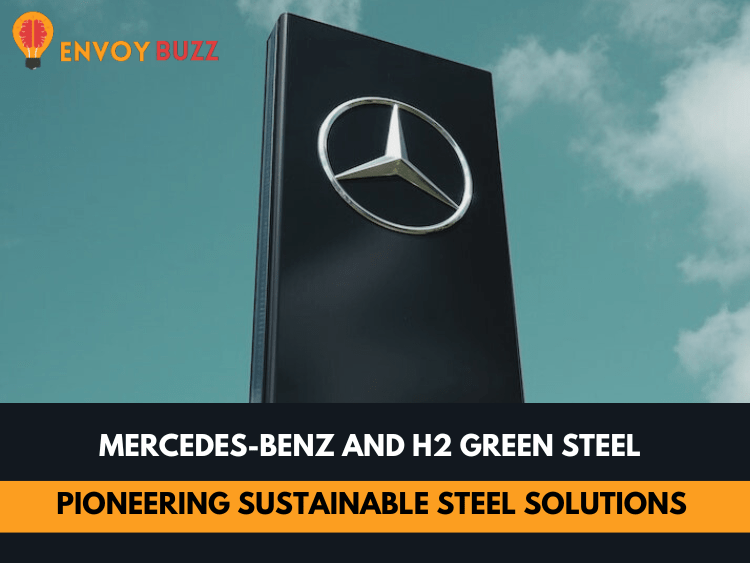| A significant step towards “Ambition 2039” | About 50,000 tonnes of nearly CO2-free steel per year will be provided by the Swedish startup H2 Green Steel (H2GS), and it will be used in several Mercedes-Benz car types. |
| A “local for local” strategy | Mercedes-Benz and H2GS also decided to continue working together with the goal of creating a sustainable steel supply chain in North America. |
| Creating a sustainable steel supply chain | Mercedes-Benz intends to work with numerous partners globally to decarbonize its steel supply chain. |
In order to develop a sustainable steel supply chain in North America, Mercedes-Benz struck a supply agreement with Swedish start-up H2 Green Steel for about 50,000 tonnes of nearly CO2-free steel annually for its European press shops. The two companies also strengthened their collaboration through a Memorandum of Understanding.
Mercedes-Benz has already finalized a key supply arrangement that lays the door for the integration of practically carbon-neutral steel in their series manufacturing by acquiring an equity position in H2GS last year. This agreement represents an incredible turning point in their journey towards sustainable manufacturing, with production set to start in 2025.
Mercedes-Benz and H2GS concurred that one goal of a larger initiative to decarbonize the supply chain is to develop a supply chain for green steel manufactured in North America for nearby Mercedes-Benz manufacturing facilities. Another significant step in further pursuing the concept of sourcing close to Mercedes-Benz production facilities is the expansion of the strategic collaboration with H2GS to North America.
“Together with our strategic partner H2 Green Steel we’ve achieved the next milestone of our local for local strategy in procurement. Based on our initial investment into H2 Green Steel we now have a finalized relevant supply agreement for Europe and are looking at establishing a sustainable steel supply with H2 Green Steel in North America.”
-Dr. Gunnar Güthenke (Head of Procurement and Supplier Quality, Mercedes-Benz Cars)
“With the supply deal of around 50,000 tonnes almost CO₂-free steel from H2 Green Steel for our manufacturing plants in Europe, Mercedes-Benz and H2 Green Steel are accelerating the creation of a decarbonized, regional and resilient steel supply chain. At the same time, we are taking our partnership to the next level with the aim of establishing a sustainable steel supply chain in North America, another important step towards making the auto industry more resilient and sustainable.”
-Markus Schäfer (Member of the Board of Management of Mercedes-Benz Group AG. Chief Technology Officer, Development & Procurement)
Manufacturing technology that is almost carbon-free:

The H2GS production site produces steel utilizing a brand-new, cutting-edge manufacturing method that is practically CO2-free. In contrast, the average amount of CO2 emitted by steel made in a traditional blast furnace is over two tonnes per ton Instead of using coking coal in the new method, the supplier produces steel using hydrogen and electricity made entirely from renewable energy sources. The iron ore’s oxygen is released and bound by the hydrogen, which acts as a reduction gas. Contrary to the usage of coking coal, this results in water vapor rather than CO2. At the beginning of supply, H2GS wants to have a footprint of 0.4t CO2 per ton of steel.
“H2 Green Steel exists because pioneering companies in the automotive industry, like Mercedes-Benz, signaled the transition in the steel industry was too slow for them to meet their climate targets. Working side-by-side with Mercedes Benz, we have a partner with whom we can raise the bar when it comes to supply chain emissions, circularity and social sustainability. They are a very strong player to liaise with for our European operations, but naturally also as we endeavor into the steel value chain in North America.” -Henrik Henriksson (CEO, H2 Green Steel)
Supply chain carbon reduction:

Together with all of its suppliers, Mercedes-Benz is aiming to have a supply chain that is net-carbon neutral by the year 2039 at the latest. The premium automaker is redesigning its supply chain to concentrate on the prevention and reduction of CO2 emissions rather than offsetting in order to meet its lofty climate targets. The three-pointed star brand has already started using low-CO2 steel in four of their series models.
This enables a greater than 60% reduction in CO2 emissions for the corresponding steel grades. Additionally, Mercedes-Benz recently announced that it would start producing aluminium that has a CO2 reduction of about 70% when compared to the average in Europe. Aluminium is a lightweight material that is becoming more and more crucial for electric vehicles. Mercedes-Benz wants to use an average of 40% more secondary raw materials in its fleet of passenger cars by the year 2020. The collaboration on levers to raise the scrap content suitably was agreed upon by Mercedes-Benz and H2GS.
Pursuing a supply chain that is ethical and sustainable:

The company is dedicated to a responsible steel supply, focusing on the use of recognized standards and reliable certificates, in addition to minimizing CO2 emissions as a result. Mercedes-Benz and H2GS are committed to establishing the highest standards for human rights due diligence throughout the supply chain for steel since they both share a similar idea of sustainability. Mercedes-Benz participates actively in the creation of a verifiable sustainability standard for the steel sector as a member of the Responsible Steel Initiative. The goal is to guarantee steel production that is both socially and environmentally acceptable along the full value chain.
For more blogs visit Envoybuzz.

